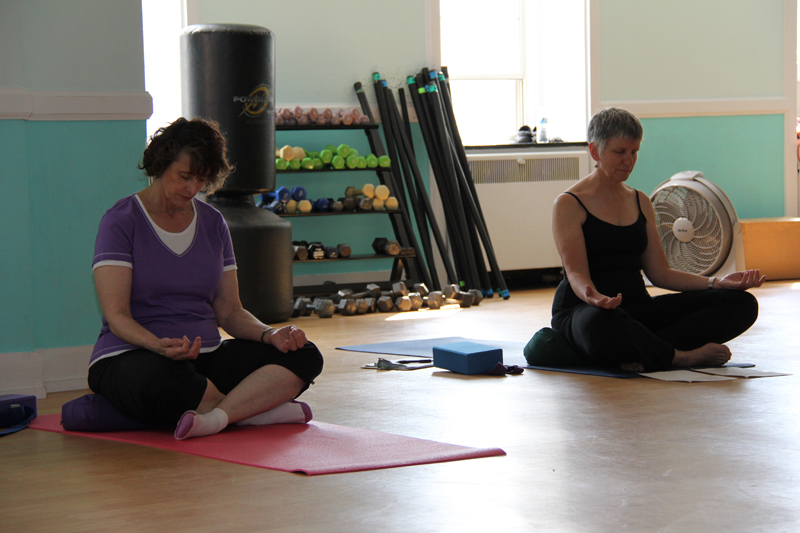Latest News
Prevention
Regaining control through yoga
Jan 30, 2017

Many cancer patients and survivors face a host of physical and mental side effects from their experience. Surgery can create scar tissue that limits movement. Chemotherapy can cause peripheral neuropathy (a form of nerve pain in the extremities) and lead to a mental fogginess often referred to as “chemo brain.” Radiation can tighten muscle fibers and limit range of movement. And many survivors deal with depression and anxiety. Fortunately, yoga has been shown to help with all of these issues.
Yoga is a mind and body practice with origins in ancient Indian philosophy. There are various styles of yoga, but most involve a mixture of physical postures, breathing techniques and meditation or relaxation. A 2007 National Health Interview Survey found that yoga was one of the top 10 integrative health approaches used among U.S. adults, and there have been numerous studies showing the benefits of yoga for cancer patients and survivors.
Mary Shall, Ph.D., chair of the Department of Physical Therapy at VCU School of Allied Health Professions, has been practicing yoga since the 1990s. Initially, her motivation was to help relieve tightness in her back, but she continued when she was diagnosed with ovarian cancer in 2009. Serving on VCU Massey Cancer Center’s Integrative Health Committee, she has helped inform programming and also led yoga workshops for patients and survivors.
“Yoga can provide a lot of benefits for cancer patients and survivors, and really anyone,” says Shall. “Some of the biggest benefits can simply come from regaining control of your body. You give up a lot of autonomy during cancer treatment, but during yoga you are in control of how much you exert yourself, your breathing, how much you stretch—that can be liberating and help people de-stress.”
Shall found that yoga helped her regain flexibility after surgery. “Your body will tell you when to stop. But if you go at your own pace, eventually you will improve your flexibility and regain some of the function you may have lost during treatment,” says Shall.
This is true for radiation therapy as well. Radiation therapy can make healthy tissue fibrotic and more resistant to stretching. Practicing yoga during and after the treatment process can help stretch out the tissue and restore mobility.
The connection between the mind and body is an important principle in yoga. The focus on breath control and mindfulness is similar to other meditation techniques, which help activate the parasympathetic nervous system. This can help reduce stress and promote healing through the immune system.
“Many patients undergoing chemotherapy will tell you they have a difficult time staying focused on the task at-hand, or that they become more forgetful,” says Shall. “By putting the focus on breathing and the present, yoga can help train the mind to retain its focus, which I found helped with the mental fogginess I experienced during my 9 months of chemotherapy.”
Mindfulness practices like yoga have also been shown to help reduce anxiety and depression. By learning to focus on the present, the mind is less likely to wander to past traumatic experiences or the unknown future. And while yoga can be practiced alone, it is often done in a group setting, which can provide a level of support for patients and survivors.
“When you regularly attend a yoga class, you naturally get to know the people you see every day or every week. For me, it was sort of like a support group,” says Shall. “If I missed a class, people would wonder if I was okay and even call and check in.”
Shall suggests talking with your doctor about potential limitations if you are currently in treatment and interested in trying yoga.
“Many places offer beginner classes, or classes designed for those with physical limitations. It is also a good idea to talk to the instructor before starting in order to let them know about any potential limitations you might have—often they can suggest substitute postures that may be more appropriate,” says Shall. “And most important, listen to your body and don’t do anything that is painful or causes discomfort.”
Written by: Massey Communications Office
Related News
Clinical Care, Prevention
Smoking cessation: Why it’s important, the benefits of quitting, and where to beginNov 20, 2025

Get access to new, innovative care
Treatments in clinical trials may be more effective or have fewer side effects than the treatments that are currently available. With more than 200 studies for multiple types of cancers and cancer prevention, Massey supports a wide array of clinical trials.

Find a provider
Massey supports hundreds of top cancer specialists serving the needs of our patients. Massey’s medical team provides a wealth of expertise in cancer diagnosis, treatment, prevention and symptom management.
